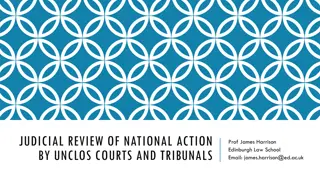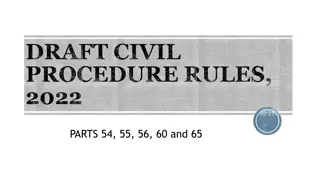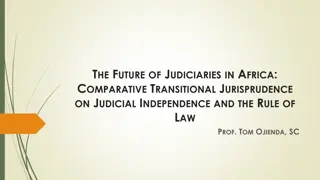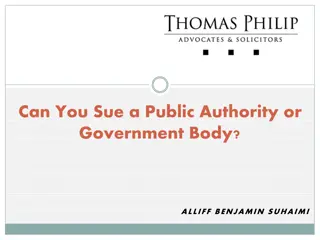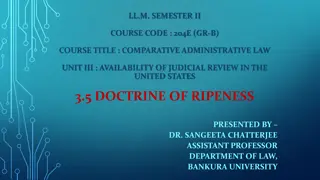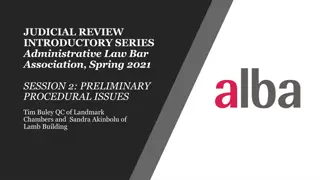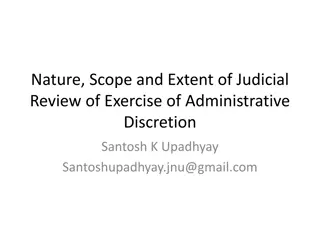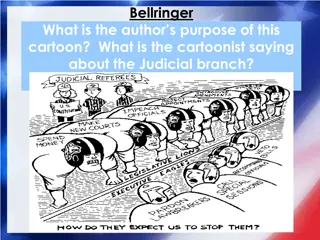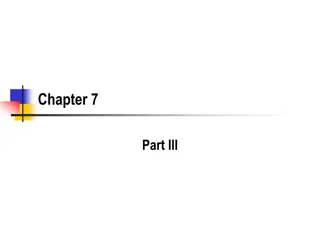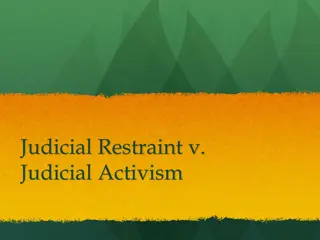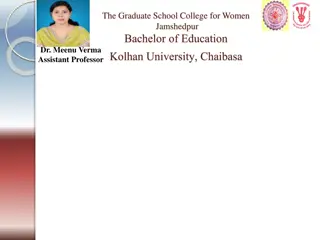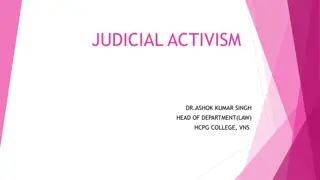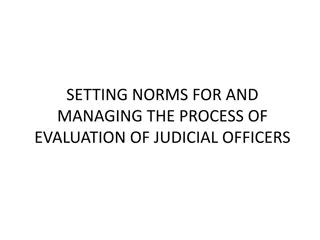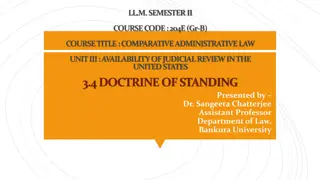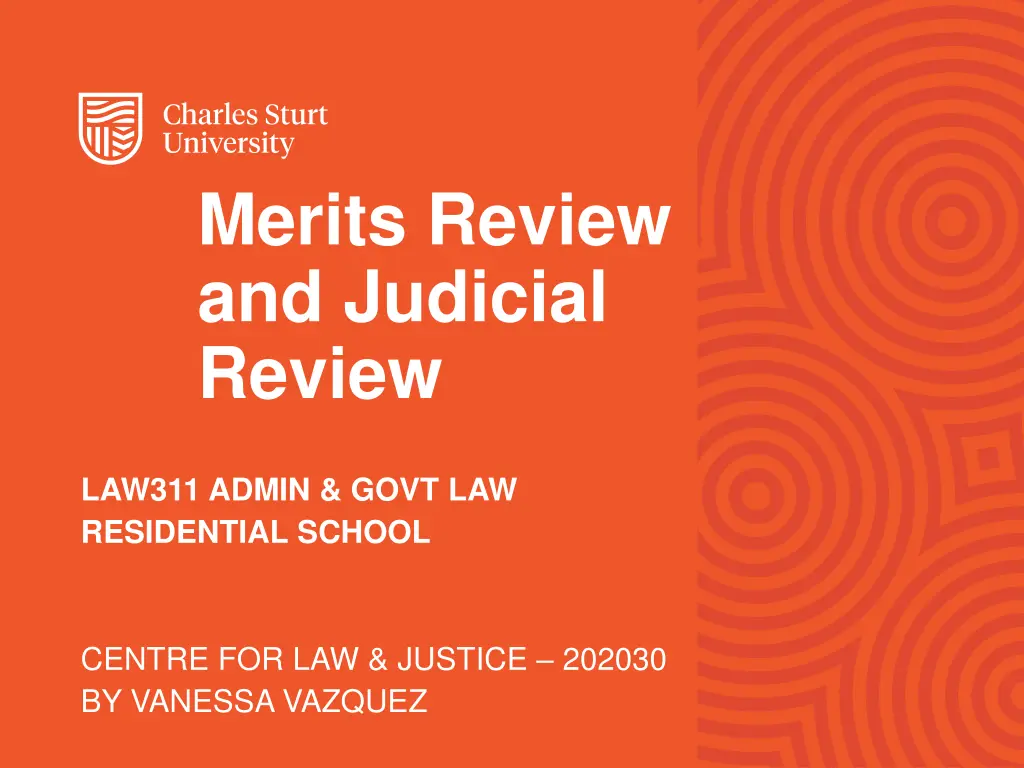
Understanding Merits Review and Judicial Review in Administrative Law
Explore the concepts of merits review and judicial review in administrative law, focusing on the reconsideration of administrative decisions by tribunals, the role of tribunals in promoting good governance, differences between tribunals and courts, and the functions of tribunals in resolving disputes effectively and efficiently.
Download Presentation

Please find below an Image/Link to download the presentation.
The content on the website is provided AS IS for your information and personal use only. It may not be sold, licensed, or shared on other websites without obtaining consent from the author. If you encounter any issues during the download, it is possible that the publisher has removed the file from their server.
You are allowed to download the files provided on this website for personal or commercial use, subject to the condition that they are used lawfully. All files are the property of their respective owners.
The content on the website is provided AS IS for your information and personal use only. It may not be sold, licensed, or shared on other websites without obtaining consent from the author.
E N D
Presentation Transcript
Merits Review and Judicial Review LAW311 ADMIN & GOVT LAW RESIDENTIAL SCHOOL CENTRE FOR LAW & JUSTICE 202030 BY VANESSA VAZQUEZ
Merits Review Merits review is the reconsideration of the correctness of an administrative decision, which involves a review of the facts of the case by an administrative tribunal (e.g. AAT). Once admin decision is made, it is operative. It can only be changed by being set aside, varied or replaced on merits review or being found to be ultra vires or for some other reason quashed after judicial review.
Why Tribunals and what for? Tribunals were designed to promote the rule of law and good governance by enabling citizens to call in question administrative decisions. The tribunal was to review decisions on the merits of questions of fact and law because such review could extend to questions of policy whilst incorporating sound elements adapted from the judicial method. The tribunal members were experts in the process of review. (pg 185) LAW314 - Linking assessments to your residential school experience 3
Tribunals less formal than Courts Tribunals are: Statutory, independent, legal institutions established to provide a forum for resolving specific types of administrative and civil disputes. (pg 155) What are the differences? 1. Not rules of evidence has probative value. 2. Different standard of proof from criminal court balance of probability (Repatriation Commission v Smith (1987) 15 FCR 327) 3. Different burden of proof dependent on area e.g guardianship there is none, occupational it is regulatory body Most states and territories have combined civil and administrative tribunal (NCAT, VCAT etc.) Commonwealth (AAT) is just administrative because of Constitutional limitations. LAW314 - Linking assessments to your residential school experience 4
The Function of Tribunals What do they do? Tribunals aim to provide informal, low cost and timely avenues for resolving disputes, can issue enforceable orders How do they do it? Through active case management, using ADR processes, limiting legal representation and costs awards and assisting self-represented litigants. Civil Matters: Alternative forums to the courts for resolving disputes such as claims related to the supply of good and services. Only state and territories have tribunals with civil jurisidiction. Many have jurisdiction for human rights cases eg guardianship, anti-discrimination and the care of children. Administrative Matters: Reconsider merits of government decisions across Commonwealth, state and territory jurisdiction in areas like veteran s entitlements, refugee applications and planning decisions. LAW314 - Linking assessments to your residential school experience 5
NCAT NSW Civil Administrative Tribunal Administrative and Equal Opportunity Arm Reviews administrative decisions made by NSW Government agencies and discrimination matters. Community services | State revenue | Job and firearm licensing | Discrimination | Working with children checks | Privacy | Access to government information | Victims services | Charity referees | Land matters | Equal opportunity Guardianship Division Determines applications about people with a decision making disability and who may require a legally appointed substitute decision maker. Appointment of a guardian | Appointment of a financial manager | Review of enduring guardianship | Review of power of attorney and revocation | Medical or dental treatment | Clinical trials | Review of orders Occupational Division Reviews decisions by government agencies about licensing and complaints concerning professional conduct and discipline. Taxi licences | Real estate agent licenses | Motor dealers and repairer licences | Licenced conveyancers | Health professionals | Legal practitioners | Veterinary practitioners | Architects and building professionals LAW314 - Linking assessments to your residential school experience 6
How Merits Review Works Merits review reconsiders a decision, de novo. The person or body conducting the merits review stands in the shoes of the decision maker and remakes the decision. Not confined to evidence before the original decision maker nor any conclusions reached by them. The review takes account of:- Issues of law Issues of fact Issues of policy; and Discretion If an appeal against this decision is made, it is usually to a court for a judicial review ie consideration of a matter of law only. (eg s44 AAT Act) Brennan CJ, Gaudron and Gummon JJ The purpose of limiting an appeal to a question of law is to ensure that the merits of the case are dealt with not by the Federal Court but by the AAT. This distribution of function is critical to the correct operation of the administrative review process. LAW314 - Linking assessments to your residential school experience 7
Before Intervening, the Tribunal must Be of the view that the facts are different from what they were believed to be by the primary administrator The law applies differently from the way in which the primary administrator applied it; or If there be a discretion, there is a way of exercising it preferable to the way in which the primary administrator exercised it. Objective - to come to the correct or preferable decision. Correct meaning correct in law or fact: Drake v Minister for Immigration and Ethnic Affairs (1976) 46 FLR 409. Preferable is reserved for discretionary decisions, where there is no correct decision, it is appropriate to substitute the preferable one McKinnon v Secretary, Department of Treasury (2006) 228 CLR 423, which should generally be guided by community standards or values Re Visa Cancellation Applicant and Minister for Immigration and Citizenship [2011] AATA 690. LAW314 - Linking assessments to your residential school experience 8
Evidence must have probative value - Tribunal cannot spin a coin or consult an astrologer . - Must take into account any material which, as a matter of reason, has some probative value . - Brennan J To depart from the rules of evidence is to put aside a system which is calculated to produce a body of proof which has rational probative force (re Pochi and Minister for Immigration and Ethnic Affairs (1979) 2 ALD 33 LAW314 - Linking assessments to your residential school experience 9
Tribunal Remedies Affirm the decision under review Vary the decision under review or Set aside the decision under review and Make a decision substitution for the decision so set aside or Remit the matter for reconsideration in accordance with any directions or recommendations of the Tribunal (section 43 of AAT Act) Exists in all states (ss pg 186) LAW314 - Linking assessments to your residential school experience 10
Judicial Review Resources When conducting judicial review the court might determine the legality of administrative action by reference to four different kinds of legal material. 1. The Constitution- executive branch must stay within assigned role 2. The Statute that the executive is charged with administering in the given instance. This statute will explicitly repose certain powers in administrative decision- makers that, within the set legal boundaries, they are required to exercise. 3. Statutory Interpretation the judiciary refers to the principles of statutory interpretation when supervising the legality of administrative action. 4. Norms of administrative law which form basis of ground for judicial review. 12
Scope of Judicial Review at State & Federal levels Different principles apply to judicial review at each level At the federal level the HC is guaranteed judicial review jurisdiction by virtue of s75 (v) of the Constitution and in matters in which the Commonwealth is a party. Jurisdiction is conferred on the Federal Court by the Judiciary Act 1903 (Cth) and by the ADJR act. State courts have what is called inherent or supervisory judicial review jurisdiction. 13 Vanessa Vazquez
Basis of Judicial Review Part of supervisory role. Focuses on legality of decision rather than correctness (or merits). Judicial review is different to appeal where courts can typically substitute their own decision for that of the original decision maker. In judicial review, the courts usually remit the matter back to the original decision maker for a decision to be made in accordance with the law. The courts can declare and enforce the legal limits of executive power but must not re-examine the merits of executive decisions. However, in practice, the distinction between these two concepts is not always clear.
Limitations on judicial review Judicial review is complex because: historically common law never subjected all government decision makers to judicial review, and some prerogative powers continue to be beyond judicial review; there have been a range of legislative attempts to diminish the courts powers of judicial review; questions arise about what types of decision should be subject to judicial review; the source and terms of the jurisdiction of the court in which the application for review is brought.
Constitutional sources of judicial review The HC constitutionally entrenched original judicial review jurisdiction is conferred in terms of the availability of particular remedies (mandamus, prohibition and injunction) against an officer of the Commonwealth. Section 39B of the Judiciary Act was inserted empowering the Federal Court to hear cases involving the original jurisdiction of the HC. As a result of a number of HC challenges to legislation seeking to narrow the scope of judicial review in migration cases in the 1990s, the HC has rebadged the language of prerogative writs with that of constitutional writs , and linked its powers of review more directly to the text of the Constitution. As a result, jurisdictional error has become the central ground for review under ss 75(v) and 39B of Judiciary Act.
Supervisory jurisdiction of State Supreme Court Statutory judicial review ACT, Qld, Tas All state Supreme Courts have common law or supervisory judicial review jurisdiction and Kirk s case recognised that aspects of state judicial review jurisdiction have constitutional significance. Non-justiciability is linked to the separation of power in that the judiciary acts as check on power, but also ensures that the courts do not meddle in political or policy matters that are more appropriate for the executive or legislature to resolve. The justiciability of non-statutory powers, such as prerogative powers, has been historically limited to asking whether the prerogative power exists, rather than how it has been exercised. This issue was considered in the High Court case of Williams and in the CCSU case which established that reviewability was to be determined by reference to the nature or subject matter of a power rather than a source. Complex relationship between justiciability and the rule of law, wherein it may be asked whether the protection of individual rights requires ALL executive decisions to be subject to review by judges, or conversely, whether non-judicial accountability mechanisms may be better placed to protect the rights of individuals.
The ADJR Act settling Jurisidictional Disputes The ADJR Act is intended to simplify access to administrative justice. For matters to be reviewable there must be:- (a) a decision or conduct engaged in for the purpose of making a decision (b) it must be of an administrative character ; (c) and it must be proposed to be made or required to made under an enactment (s3 of the Act). Issues: Where to draw the line between administrative and non-administrative decisions; What is meant by under an enactment and What is a decision or conduct engaged in for the purpose of making a decision?
Under an Enactment The constitution is not an enactment therefore decisions made under the inherent executive power are not reviewable under the ADJR Act (eg Dixon v Attorney-General (1987) 15 FCR 327) Also, decisions re exercise of prerogative power are not made under an enactment . Eg Tampa case, government argued that its actions in turning away boat of refugees made under prerogative power, rather than Migration Act 1958 (Cth) which required asylum seekers to be brought ashore to be detained. It is not clear whether decisions by non-governmental entities under statutory schemes of regulation are made under enactment and can therefore be reviewable under the ADJR Act. Problem area for privatisation and out-sourcing of government functions. Federal court has generally denied ADJR Act coverage of the contractual decisions of statutory bodies. Instead, powers may come from Corporations Law. Recent HC cases suggest that whether a decision is made under enactment depends not only on the source of the power or capacity to make a decision, but also on whether the legal consequences of a decision derive from the statute.
Griffith University v Tang Under an Enactment Relevant statute: Griffith University Act 1998 (Qld) The assessment board conducted an inquiry and found that Tang had engaged in academic misconduct. She was asked to respond and didn t. The board recommended her exclusion from the university. She appealed to the university appeals committee, which dismissed it. She then sought review under the Judicial Review Act (Qld) on grounds of denial of procedural fairness and university s failure to follow its own procedures. University argued that none of the decisions was a decision under enactment . Relations between parties were not governed by a contract. High court found that the decision of university appeals committee made as part of consensual relationship between the parties and thus not a decision under enactment . Narrows the scope of public law.
Remedial models Common law Common law prerogative writs (certiorari, prohibition and mandamus) * must include jurisdictional error. Common law allows applicants to access three remedial outcomes:- 1. no remedy 2. retrospective invalidation (from time decision was made) 3. prospective quashing (from time of court s order). However, not all administrative errors are remediable. There are unremediable errors. This is because of administrative discretion to exercise a power. In this case the court s role is not to tell administrator that their exercise of discretion is wrong but rather to confine and structure the use of that discretion. Court not to usurp administrative power but rather supervise that power.
Remedial models ADJR Act If it is established that a specified ground of review has been established then the court may make any combination of order in section 16 of the Act. Under the Act there are no breaches of administrative law norms that are unremediable.
Jurisdictional Error A Decision affected by jurisdictional error under common law was retrospectively invalid, a decision affected by non-jurisdictional error was either prospectively unlawful (error of law on the fact of the record) or valid. Issues of ultra vires decisions decision makers must not act beyond their powers. These are often used interchangeably. 23
Judicial Review Remedies Certiorari quashing deprives a decision of legal effect either retrospectively or prospectively. Often combined with mandamus which compels decision maker to remake decision. Mandamus is an order to enforce the performance of a public duty and is available in cases where there has been actual or constructive failure to perform the duty or exercise a jurisdiction. NOT normally used to compel a decision maker to exercise a discretionary power in a particular way Prohibition order to refrain from exceeding its jurisdiction. Not available in relation to non-jurisdictional errors. Presumes that decision-maker has not completed its function (once decision too late to seek) Declaration - Declaratory relief is the power of a court to make an order declaring the way a particular power or remedy should be exercised. Injunction - Used to restrain people from acting in a manner inconsistent with their legal duties or in some cases get people to act in a particular way. performs functions equivalent to prohibition and mandamus but notably can be used in non-jurisdictional error. LAW314 - Linking assessments to your residential school experience 24
Privative Clauses Restricting Judicial Review Section 75 (v) of the constitution entrenches HC jurisdiction to issue remedies for prohibition, mandamus, and injunction. Parliament CANNOT deprive the court of its jurisdiction to issue these remedies on the basis of jurisdictional error. However, the principle has not automatically invalidated legislative attempts (known as privative clauses) to exclude certain decisions from judicial review. No constitutional protection of the supervisory jurisdiction of the supreme courts although in Kirk v Industrial Relations Commission of New South Wales [2010] HCA 1, the HC established that the constitution also entrenches judicial review at the state level and that the legislature could not deprive the supreme court of any state of it characters as a judicial institution. As a result, the basic principles relevant to the interpretation and validity of federal privative clauses can now also be applied to the states. LAW314 - Linking assessments to your residential school experience 25
Courts interpretation of Privative Clauses HC has taken an interpretative approach to determining the validity of federal privative clauses as set out in R v Hickman: Ex parte Fox and Clinton (1945) (the Hickman approach). The HC sought to reconcile two contradictory statutory provisions, one of which was a privative clause. Court held the clause was valid. This did not mean judicial review was ousted but rather that the only enforceable limitations on the administrative decision maker were:- (a) the power exercised related to the subject matter of the legislation and (b)the decision was reasonably capable of reference to the power given to the body under statute. LAW314 - Linking assessments to your residential school experience 26
Hickman Reconsidered Plaintiff S157/2002 v Commonwealth of Australia (2001) 211 CLR 476 A privative clause in the Migration Act 1958 (Cth) was found not to protect a decision that was infected by jurisdictional error, as such an expansive interpretation of the privative clause would generate a direct conflict with s75 (v). As the alleged error in Plaintiff was a denial of procedural fairness, the privative clause in the Migration Act did not protect the challenged decision from review. As a result, the privative clause was not found to be unconstitituional but was deprived an any meaningful role. The underlying constitutional principles are likely to be relevant to statutory attempts to limit judicial review whether by way of traditional privative cluses or some other legislative techniques. Plaintiff entrenched a minimum provision of judical review that no privative clause could erode. The judges observed that the purpose s75 (v) is to secure the rule of law, ensuring that officers of the Commonwealth obey the law and neither exceed nor neglect any jurisdiction which the law confers upon them. LAW314 - Linking assessments to your residential school experience 27
Thanks for your time! See you in tonight s live Zoom session for our final residential school Q and A.

